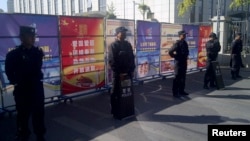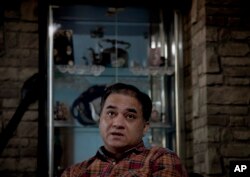China's sentencing of Uighur scholar Ilham Tohti to life in prison this week has triggered a wave of criticism, both from rights activists in the country and from foreign governments and advocacy groups overseas.
In response, China’s state media have begun hitting back, writing scathing accounts of Tohti’s alleged crimes and telling foreign governments and rights groups to mind their own business.
In its account of the trial released Thursday, China’s Xinhua news agency says court documents show the former economics professor mesmerized his students, preached violence and promoted separatism. It also says the court found him guilty of organizing a criminal group to promote independence and sow discontent among China’s ethnic groups.
Xinhua said more than 200 pieces of evidence were presented to the court during the trial, including video footage of Tohti allegedly calling on his students to fight the Chinese government and calling China’s ruling authorities a “devil to the Uighur people.”
Xinhua did note that Tohti denied all of the charges against him and argued that he did not intend to split the country. Tohti told the court that the articles that were printed on his website Uighur Online were merely academic points of view, Xinhua added.
Tohti’s lawyers say that he has already signed his appeal and that the details of that 15-page document will soon be released online. Tohti denies all of the charges that have been brought against him.
One of his lawyers, Liu Xiaoyuan, says the evidence disclosed in court is insufficient to convict Tohti of the crimes he stands accused of committing. He also adds that there are contradictions in the court’s accusations as well.
Liu says the students who worked on Tohti’s Uighur Online did not confess to any crimes. They only admitted they had worked together with the professor to run the website.
“Several of the students only began working on the website a couple years ago, but the public prosecutors have accused them of creating a separatist criminal group in 2006, and that some 50 to 60 individuals were part of the group,” Liu said.
He says that, while eight of his students were taken into custody, it was only Ilham Tohti facing charges in court.
According to Xinhua, the court revealed that Tohti told his students in the classroom “Don’t think that fighting with violence is terrorism.” The report did not elaborate about the context of the remarks and what Tohti might have meant by the comment, leaving wide room for interpretation.
In interviews with VOA, Tohti has made similar remarks, but when he did he was referring to just how difficult it is in China to tell whether incidents in Xinjiang or the attack in Beijing late last year are acts of terrorism or local disputes.
When violent incidents occur, Chinese authorities release very little information. Xinhua in many cases is the only news agency allowed to report on sensitive news stories such as the attack on Tiananmen Square last October.
Liu says Tohti’s case is really about freedom of speech, and what he said in the classroom or published on his website.
“The situation in Xinjiang now is very tense," added Liu. "And that’s why some of the details of the case are so unrealistic.”
State media have also been incensed by comments some have made online comparing Ilham Tohti to South Africa’s Nelson Mandela. In a shrill editorial released this week, Xinhua accused those who would make what it called an “irritating comparison” of being “ignorant of history.”
The report said that while Mandela was known for his iron will in his fight against South Africa’s system of racial segregation known as apartheid, Tohti has been creating estrangement between ethnic Uighurs and other groups.
In its attack, the article also argued that he was colluding with foreign powers to, as it put it, “hype Xinjiang-related incidents” in a bid to internationalize domestic issues. Interestingly, both Tohti and Mandela were sentenced to life in prison while in their in 40s and accused of colluding with foreign powers.
Both the United States and European Union have condemned the ruling and called for Tohti’s immediate release. And China’s state-media have responded in kind urging foreign governments to stay out of the country’s internal affairs.
An opinion piece in Communist Party-backed Global Times called such efforts to sway China’s courts “futile” arguing that a “criminal is a criminal.”
The article noted that dissidents in China should realize just how little the West can do to intervene.





